Awareness of our fragile world and its limited resources has finally dawned on the tourism industry and given birth to the term “Eco-Resort.” Both the supply side and the individual traveler have come to understand the need to protect and preserve physical destinations and their inherent cultures if future generations are to enjoy them as we do. Mikaku Doliveck is doing his part with the creation of the new Floating Leaf Eco-Retreat in Bali where he “walks the talk” by applying responsible and sustainable practices.
Mikaku, Floating Leaf is already being recognized as an exemplary model for sustainable living without compromising luxury, design or technology. Tell us how implementing “permaculture principles” supports sustainability.
Permaculture is more than just growing fruits and vegetables. It is a creative design process based on ethics and elements of design. It teaches us that rhythms and relationships in nature can be applied to all aspects of human habitation, from agriculture to eco-conscious construction, to education, social structure and even economics.
There are 12 basic permaculture principles and while we attempt to employ all of them, a couple stand out for us.
- Integrate rather than segregate: This applies to Floating Leaf in so many ways. From a garden perspective, putting the right plants in the right place and cultivating relationships between those plants is important. They will harmoniously work together to support each other and grow better than they would on their own. In a broader perspective, this is also how we attempt to integrate into our community. It is imperative that we are active participants in the village and do our part to help and give back whenever we can.
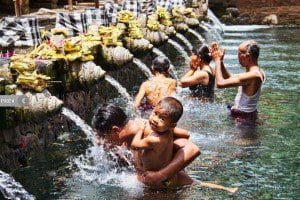
A Balinese Hindu Cleansing and Purification Ceremony at the Sacred Springs of Tirta Empul at Tempak Siring Temple in Bali - Observe and interact: We are here to learn and to hopefully become a positive part of the community that has allowed us to live amongst them. While we want to help and even teach at times, we strive to come from a place of love and support. Our neighbors and our neighbors’ ancestors have been here doing their thing for centuries, and doing it incredibly well. We do not want to disturb that. We embrace it and do what we can to help.
The other principles that we embrace in order to support sustainability include:
- Catch and store energy
- Obtain a yield
- Apply self-regulation and accept feedback
- Use and value renewable resources and services
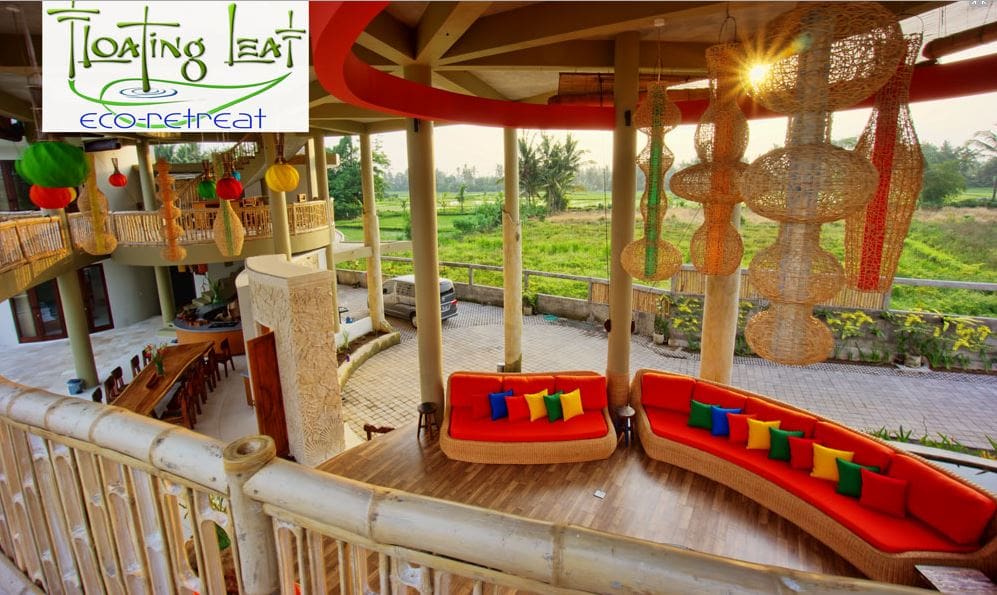
How were sustainability and eco principles incorporated into the design and building of the resort?
Floating Leaf adheres to three basic principles of sustainability:
- Environmental Stewardship – Our design, materials and efforts revolve around environmentally sensitive solutions.
- Minimum Impact Strategies and Techniques (MIST) – Construction is limited to less than 40% of our land and the remaining majority is dedicated to an organic permaculture garden where we can grow our own fruits, vegetables and herbs. We also strive to produce as little waste as possible. All of our water is treated and reused including the pool water and septic tank. Left over food is fed to animals and the rest is composted. Conservation and recycling is practiced in many forms throughout the property.
- Community Outreach – At its heart, our Bali eco retreat is an educational facility. Floating Leaf exists to help, teach and inspire others. We live, work, play and grow in harmony with our community. Their support and encouragement of our project has been a driving force in our development and we give back in many ways.
More particularly at Floating Leaf we:
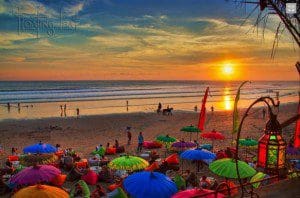
- Encourage staff and guest involvement in environmental issues through practices as well as appropriate information, training and participation exercises. We have a proactive environmental policy and train our teams in green thinking to ‘eliminate, reduce, reuse, recycle.’
- Promote energy conservation by efficient use, careful planning and design with due regard to improved energy utilization and appropriate investment in energy efficient measures.
- Floating Leaf Eco-Retreat has demonstrated the highest level of environment sensitivity by using paints that are eco-friendly. The exterior of our hotel is a water based paint with negligible VOC (Volatile Organic Compound) content of only 0.0125% and the paint used for interiors has 0% VOC.
- Minimize waste and ensure that there is effective control, which promotes recycling where possible and provides responsible disposal.
- Promote environmentally responsible, ethical and fair trade policies in all its commercial activities, including purchasing and investment.
- Strive to eliminate the release of pollutants, to be achieved by application of discharge controls, and also by initial assessment and continuing evaluation of the appropriateness of and need for any activity, which could have an impact on the environment.
- Take into consideration the likely environmental effect of hotel activities and developments on the local community.
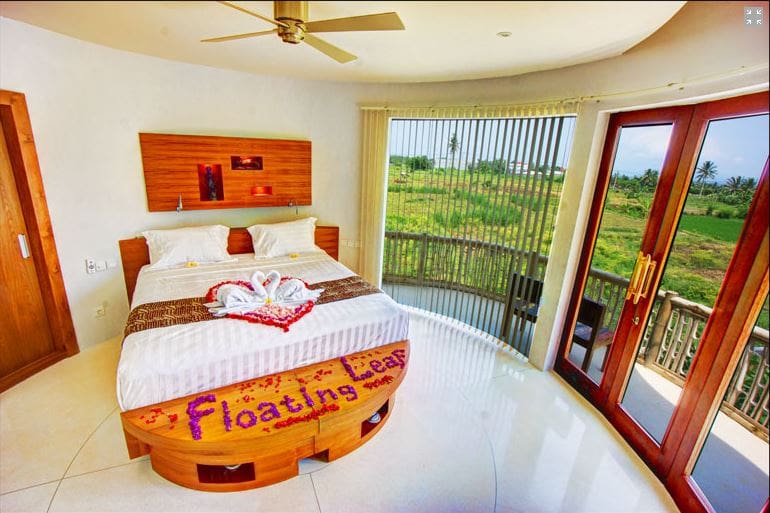
Genuine eco accommodations:
Our entire property is built upon permaculture principles in order to be an exemplary model for sustainable living without compromising luxury, design or technology.
- We are 100% self sufficient with our water usage. Not a drop is taken away from the farmers and no dirty water is introduced into the environment. We make use of massive rainwater harvesting systems
- Solar charging stations for laptops, smartphones, cameras, etc.
- Passive cooling ventilation systems
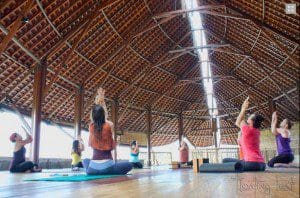
“The Sanctuary” makes use of passive cooling, green walls and roofs, sustainable materials and other eco-friendly methods to enrich a deeply natural yoga experience. - Organic permaculture garden on site
- Locally sourced, recycled, reclaimed, sustainable, and renewable materials like bamboo
- Reducing our carbon footprint
- Energy-efficient air conditioning
- Energy efficient lighting, appliances and electronics
- Water efficient machines
- Eco-friendly saltwater swimming pool
- Natural filtration koi pond
- Bulk dispensers for soap and other consumables – reduces wasteful packaging
- Hotel recycling bins make recycling easy and convenient for everybody
- Garden composting program, garden used as education resource for local school children, wild life protection, conservation and enhancement program
- Locally sourced deliveries and produce with a sustainable procurement policy
- Green walls and roofs
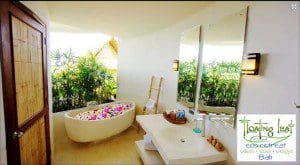
Luxuriate in your private garden bathroom with high quality organic toiletries, plush towels and modern conveniences. - Air-conditioning not required in over 80% of the building
- Adherence to environmental legislation with a commitment to continuous improvement with a positive preference Local employer / using local contractors
- Subsidize local farmers and encourage and promote organic farming
- Environmentally friendly towel and sheet re-use program with a volatile organic compound free cotton towels and sheets – for better air quality and allergy awareness when choosing furnishings and cleaning materials
- Paper reuse and water based ink printing
Waste water treatment and power generation often leave a heavy eco-footprint. How does Floating Leaf minimize their environmental impact?
Our proudest achievement is that we are 100% self sufficient with our water. There is a growing water crisis in Bali and we did not want to contribute to this. We do not take a single drop of water from the farmers. Any water that we introduce into the environment is clean and usable. We have massive underwater tanks so the name Floating Leaf is quite apt in this regard. We use natural filtration processes and harvest rainwater as well. Phase B is solar and we are currently researching the best methods for its implementation.
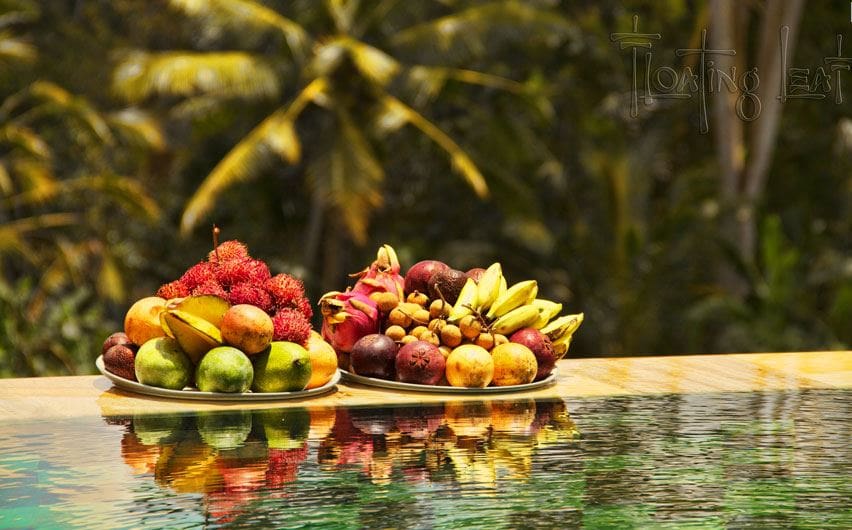
At Floating Leaf Eco-Retreat, you take food very seriously! Tell us about your garden and food sourcing. How do these practices enhance the luxury of your guests’ experience?
We take your food choices very seriously at Floating Leaf, and we promise to serve only the healthiest, most nutrient rich foods available. Meals are created with the guests’ ultimate health in mind. The health of their organs, cells and mind set. As mentioned, we have a permaculture garden on the property and grow organic fruits and veggies. We also subsidize local farmers so that they can get back to traditional means of farming. So much pressure has been put on these farmers and their profits cut so severely, that many have had to abandon their farms. Some that have been able to survive have had to adopt chemical means to increase productivity. Others have switched to crops that require less time to grow but are nutrient deficient and susceptible to pests, in order to keep up. We offer local farmers additional payments and tools so that they can grow traditional crops in a traditional manner, and keep the nutrients in and the chemicals out.
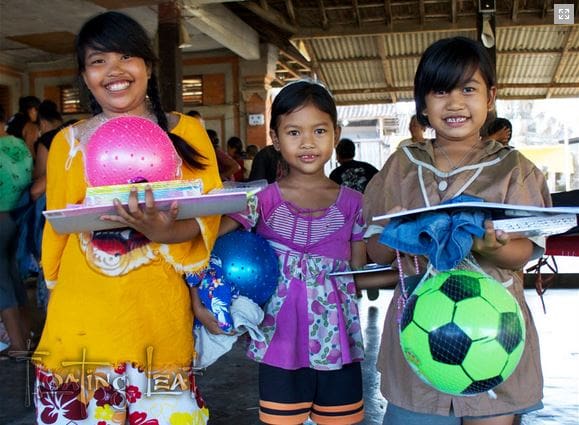
Part of sustainable eco-tourism is preserving and helping local cultures. In what ways does Floating Leaf give back to the local community?
Floating Leaf Eco-Retreat regularly holds events in which we can provide tangible assistance for important community needs. Through our donation programs, we are helping people in need in our community and throughout many villages in Bali. Floating Leaf offers classes in yoga, English, sustainable agriculture, permaculture and more to the friendly people of our village and all Balinese free of charge. Floating Leaf recently donated brand new laptop computers to local villages and is holding basic computer skills workshops.
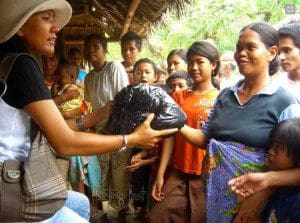
Our mission is to provide clothing, supplies and the tools needed to help people in need, inform supporters about issues affecting our community and help people connect with local organizations or issues that resonate with their skills, values and personal experiences.
Our Eco-tourism efforts are aimed at conserving precious natural resources and diverting waste from the already overflowing landfills. We strive to involve the community in deciding exactly which philanthropic efforts will be of most help and interest to them. Some projects include building water purification facilities, playgrounds, greenhouses and subsidizing local farmers so they can grow nutrient rich foods using traditional and organic methods.
We endeavor to provide learning opportunities both through educational programs and by demonstrating examples of sustainable living within our local community, Bali as a whole and all those that come to our eco-retreat. It is essential for us to give back to the gracious and graceful people of the island as they have been so good and generous to us.
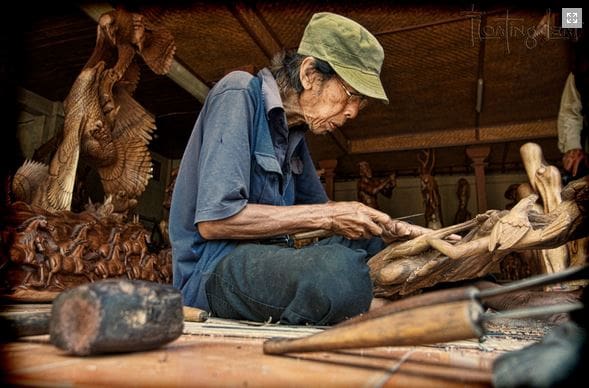
Does Floating Leaf facilitate ways for guests to engage with the local culture? How?
We hold evenings of cultural exchange where our guests interact directly with the people of our village. They learn how to play traditional instruments like Gamelon, learn dances, how to prepare food and to genuinely connect with others of a different culture. We encourage our guests to bring donations and they are exchanged at these gatherings. There is rarely a dry eye left at the end of the night and years later I hear back from past participants how it was the most impactful activity in their Bali vacation.
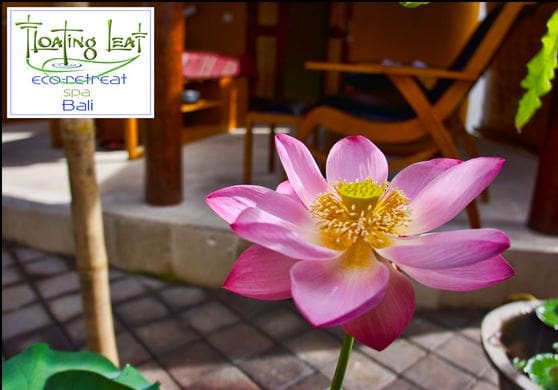
Floating Leaf also offers the Melati Spa run by your lovely wife, Putu, a schedule of yoga retreats, as well as surf clinics and packages. With so much to do – and to have time for relaxing – how many nights do you recommend for guests coming from the U.S.?
For retreats, 6-7 days works quite well.
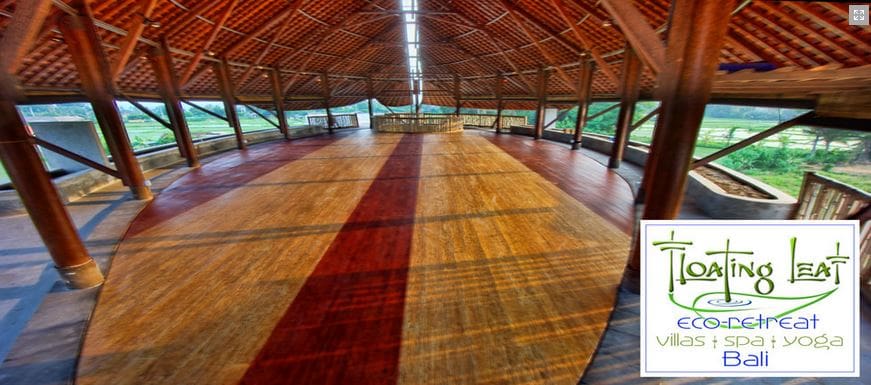
Obviously, bringing Floating Leaf Eco-Retreat to fruition has been a labor of love for you. Now that your first guests have arrived, what are you most proud of?
When a guest notices and appreciates the small details, it gives us great pleasure.
Thank you, Mikaku for sharing your beautiful eco-resort with us.
~~~~~~
For more information on travel to Bali and reservations at the Floating Leaf Eco-Retreat, please contact the Vacation Specialists at Covington Travel.
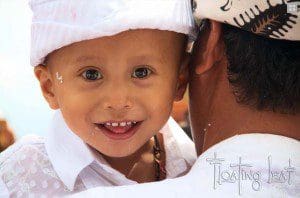
About Mikaku:
Mikaku Doliveck, an artist and former art professor, has been coming to Bali for over two decades. He is an award-winning photographer and educator and loves to share his passion for Indonesia and its many hidden wonders. He has written numerous articles on Bali’s culture, art, mysticism, healing and more. He enjoys yoga, permaculture, surfing, and most of all, being a daddy. He was awarded “Travel Photographer of the Year” for 2013 and loves to share the mystical and magical aspects of Bali with his guests that most tourists never see.
Visit Floating Leaf online at www.balifloatingleaf.com.
All photos courtesy of Maikaku Doliveck

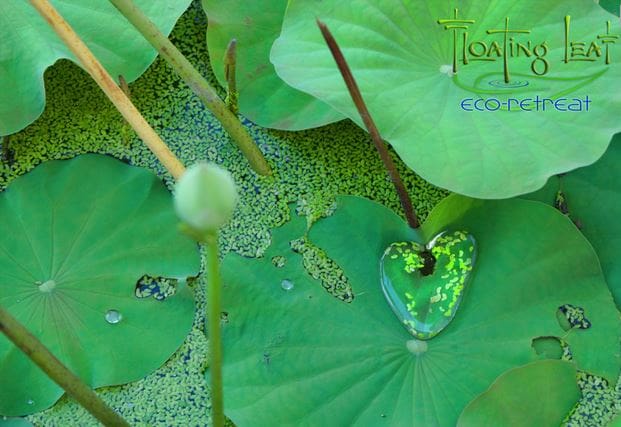
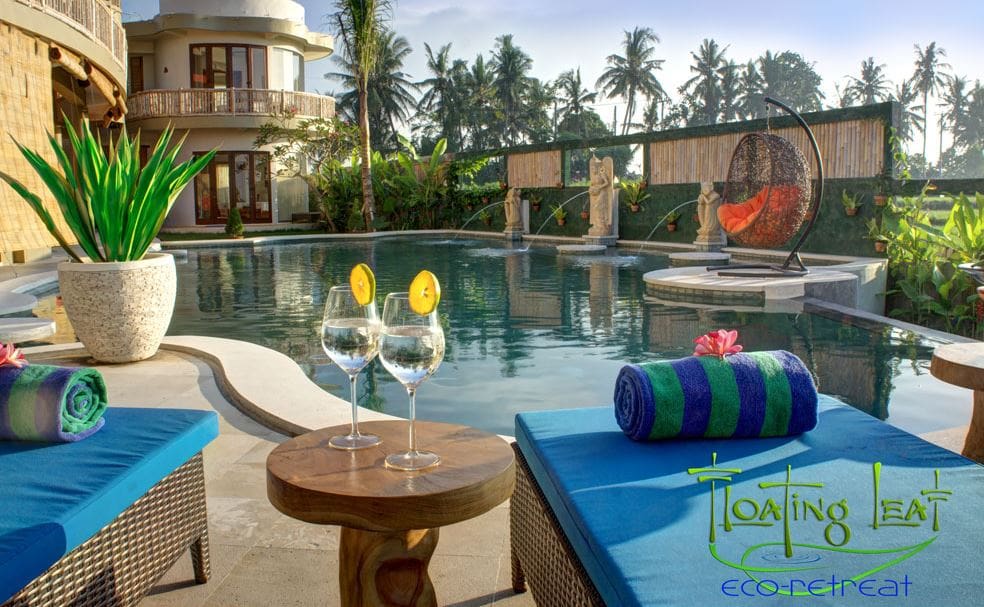





Leave a Reply